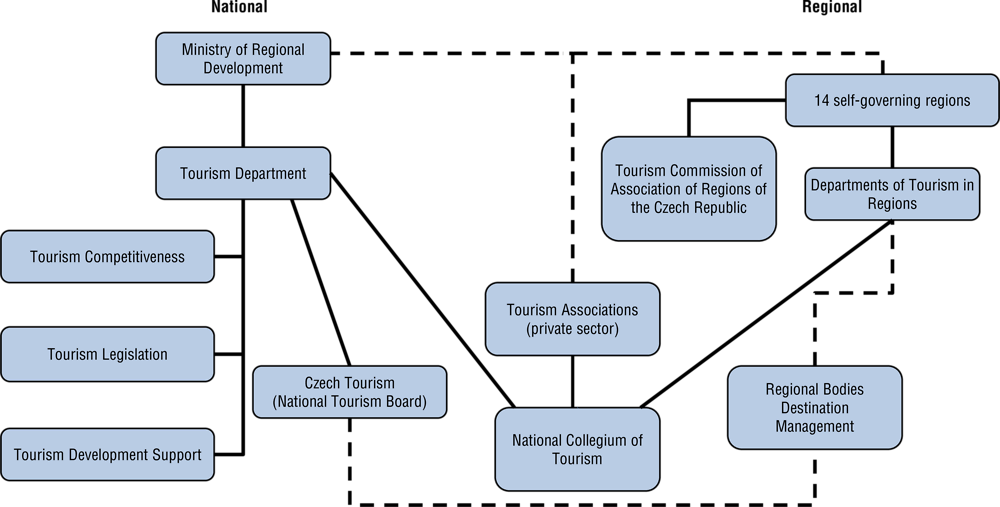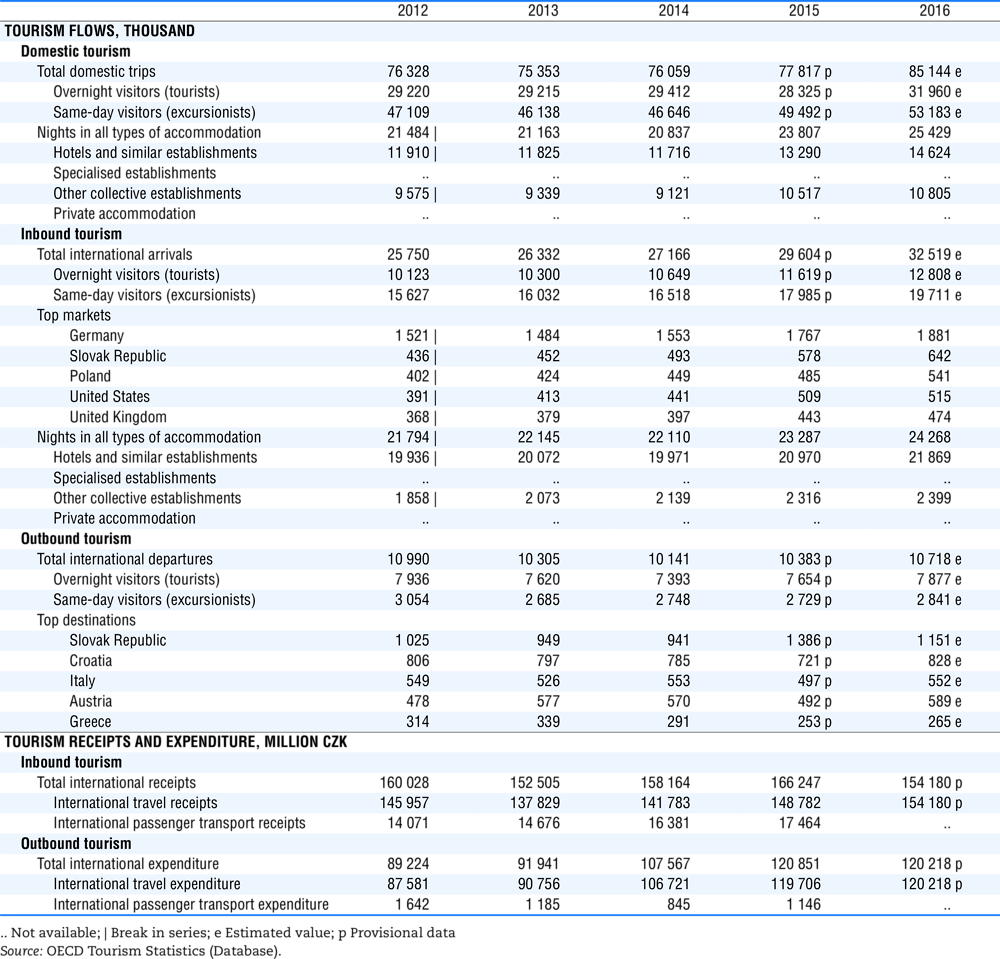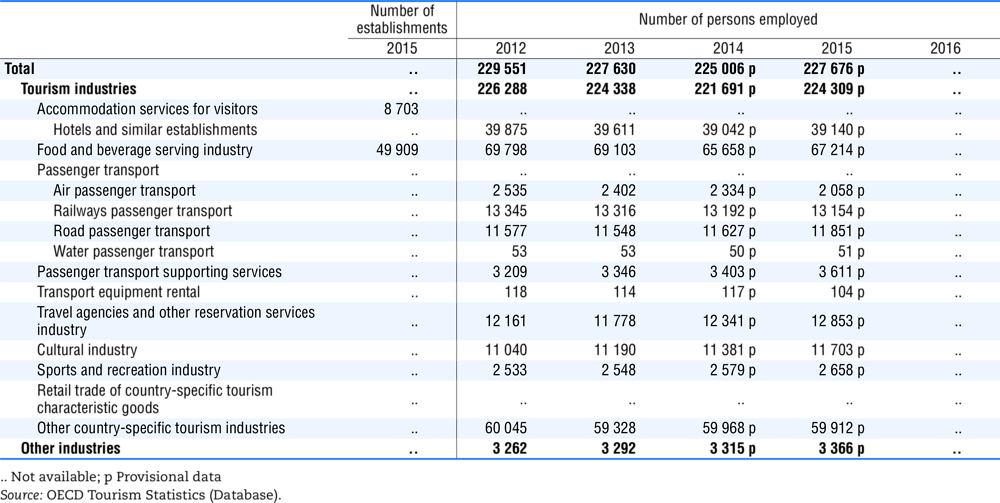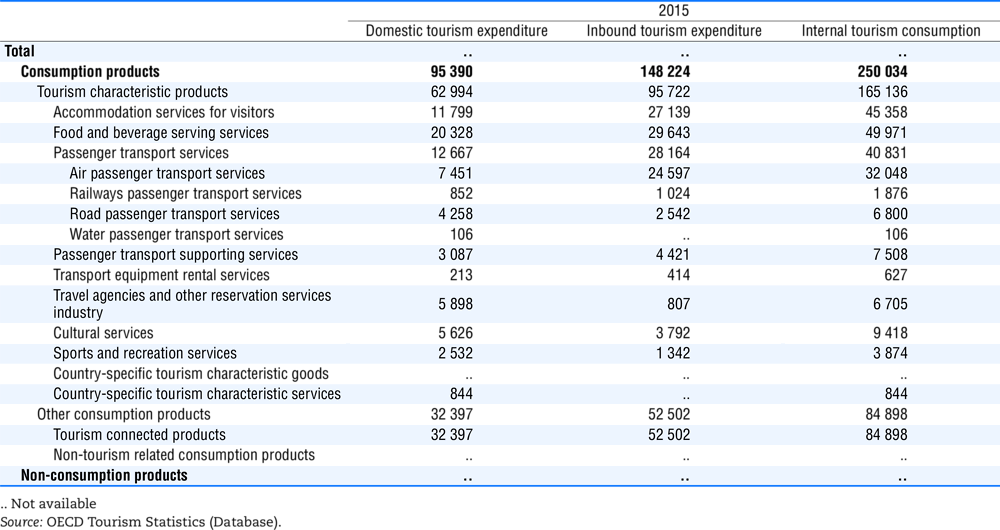Czech Republic
Tourism in the economy
Tourism’s share of GDP in the Czech Republic has been slowly increasing up from 2.7% in 2011 to 2.8% in 2015. The number of people employed in tourism totalled 227 676 in 2015. The sector’s share of total employment in the country has remained relatively stable at around 4.5 % since 2011.
The total number of foreign visitor arrivals was 29.6 million in 2015, approximately 39% of which were by overnight visitors, while 61% were same-day visitors (including those in transit). Some 8.7 million non-resident guests stayed in collective tourism accommodation establishments in 2015, up from 8.1 million in 2014 (up 7.5%). The average annual growth in guest numbers at collective accommodation establishments was 5.1% between 2012 and 2015.
In 2015, international tourism receipts totalled EUR 5.5 billion (up 6.3%) with travel’s share of total export revenues amounting to 4.7%. International travel expenditure was EUR 4.3 billion (up 11.2%), resulting in a positive balance on the travel and tourism account of EUR 1.2 billion in 2015.
Tourism governance and funding
The Ministry of Regional Development is responsible for coordinating and setting guidelines in the tourism sector. The Tourism Department carries out activities related to the development and implementation of tourism policy. It implements measures arising from tourism-related strategies, and undertakes activities to enhance awareness and recognition of tourism as an important industry within the national economy, and strengthen international co-operation. The Ministry is also responsible for preparing relevant legislation as well as monitoring and collecting statistical information, developing tourism in the regions and supporting the quality and structure of tourism services.
The Czech National Tourism Board, CzechTourism, is a grant-aided organisation supported by the Ministry of Regional Development. Its principal mission is to generate awareness of the Czech Republic as a tourism destination. Its main partners are the regional tourism organisations, municipalities and business enterprises. CzechTourism’s objective is to promote tourism in co-operation with the private sector, and to review the medium-term strategy for the marketing of tourism products in domestic and international markets.
The organisation of tourism in the Czech Republic is strongly influenced by the respective administrative systems of the 14 self-governing regions in the country. The regions and individual communities are represented by different public institutions and co-operation between national and regional tourism organisations is critical. In every tourist region, a coordinator is appointed to coordinate the marketing activities of all public tourism bodies and act as the communication channel between regional public tourism bodies and CzechTourism. Ad hoc working groups are set up as required to assist with tourism policy, drafting of tourism legislation, the preparation and elaboration of tourism support programs, etc.
The National Collegium of Tourism is the consultative and advisory body of the Ministry, facilitating co-operation between state administrative bodies, self-administrative bodies, professional associations, the academic sector, independent experts, the public, unions and other stakeholders.
The Tourism Department’s budget in 2016 was EUR 8.4 million, a reduction of 15.9% on the previous year. CzechTourism’s budget in 2016 was EUR 17.1 million representing a reduction of 14.8% from 2015.
New operational programmes in tourism over the 2014-2020 period have also been cut back compared to the programming period 2007-2013. The most significant impact is on the development of tourism infrastructure, marketing activities, statistics and market research.

Source: OECD, adapted from the Ministry of Regional Development, 2018.
Tourism policies and programmes
The Ministry for Regional Development has prepared a National Tourism Policy for 2014-2020, which was approved in 2013 along with a marketing strategy (2013-2020). The strap line for the strategy is “Destination Czech Republic – number one in the heart of Europe” with a global objective of increasing the competitiveness of the tourism sector at the national and regional levels and maintaining its economic performance through a balance between economic, socio-cultural, environmental and regional development.
The specific aims and priorities of the policy are to:
-
Enhance the quality of the tourism supply, including cultivating of the business environment,
-
Build a structure of institutions to effectively implement the tourism policy,
-
Improve the quality of human resources,
-
Improve the access of service providers to tourism markets,
-
Strengthen the role of tourism in the economic and sectoral policies of the state.
There are three measures aimed at tackling the high-priority challenges for tourism in the Czech Republic:
-
The Ministry for Regional Development, in co-operation with CzechTourism and tourism stakeholders, is implementing a project previously co-financed by the EU Structural funds on service quality. The Czech Service Quality System, which is based on the Service Qualität Deutschland system, is an innovative system of certification aimed primarily at small and medium-sized enterprises (SMEs) active in tourism to enable them to improve the quality of their services and to gain much-needed expertise.
-
The Ministry of Regional Development, in co-operation with the Czech Statistical Office, is currently implementing a project on tourism statistics, aimed at improving and expanding statistical data related to inbound tourism to the Czech Republic. This project includes an inbound tourism survey and analysis for the Tourism Satellite Account.
-
The government is implementing the National Support Programme for Tourism in Regions 2017-2020. Grants under this programme include a maximum of 50% of project funding with the balance coming from the applicant’s own resources. The programme is aimed at supporting tourism infrastructure and marketing activities. The first allocation for both sub-programs is EUR 11.2 million. Potential grant recipients include regions, municipalities, businesses and non-profit organizations. Support for marketing activities is aimed at destination management organizations. The programme is a successor to the National Support Programme for Tourism 2010-2016 in which more than EUR 15.2 million was allocated from the state budget for 291 projects.
Regular monitoring reports include key indicators such as the number of nights spent by domestic and foreign visitors in collective accommodation establishments, occupancy rates, the number of people employed in tourism, the gross domestic tourism product, domestic and inbound tourism consumption, foreign exchange earnings from tourism and the World Economic Forum index of competitiveness.



